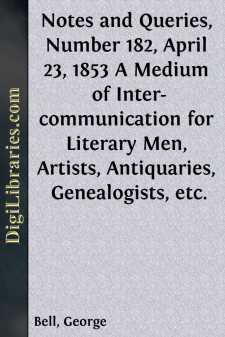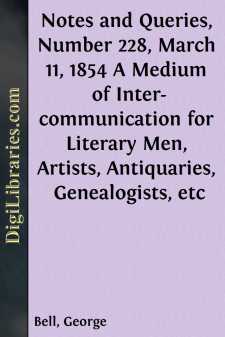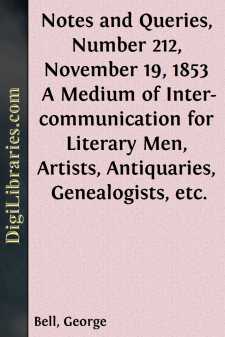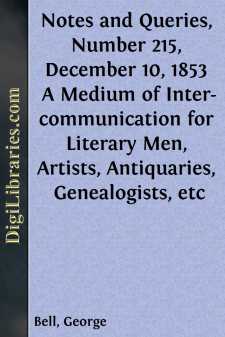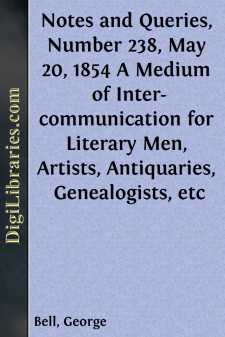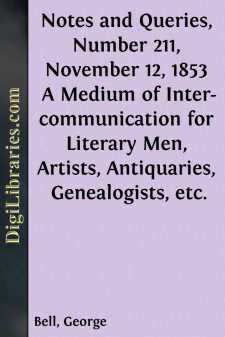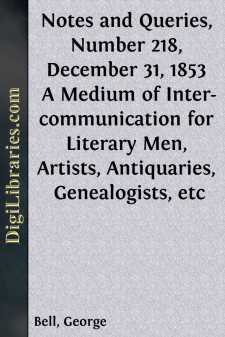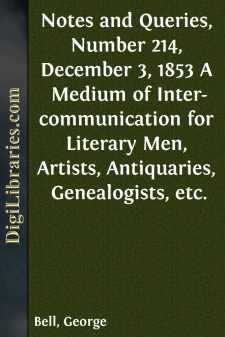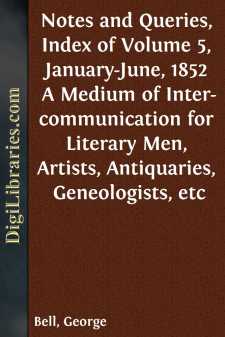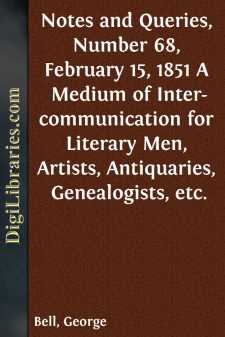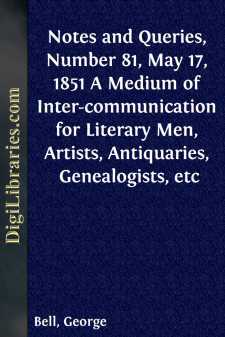Categories
- Antiques & Collectibles 13
- Architecture 36
- Art 48
- Bibles 22
- Biography & Autobiography 813
- Body, Mind & Spirit 142
- Business & Economics 28
- Children's Books 17
- Children's Fiction 14
- Computers 4
- Cooking 94
- Crafts & Hobbies 4
- Drama 346
- Education 46
- Family & Relationships 57
- Fiction 11829
- Games 19
- Gardening 17
- Health & Fitness 34
- History 1377
- House & Home 1
- Humor 147
- Juvenile Fiction 1873
- Juvenile Nonfiction 202
- Language Arts & Disciplines 88
- Law 16
- Literary Collections 686
- Literary Criticism 179
- Mathematics 13
- Medical 41
- Music 40
- Nature 179
- Non-Classifiable 1768
- Performing Arts 7
- Periodicals 1453
- Philosophy 64
- Photography 2
- Poetry 896
- Political Science 203
- Psychology 42
- Reference 154
- Religion 513
- Science 126
- Self-Help 84
- Social Science 81
- Sports & Recreation 34
- Study Aids 3
- Technology & Engineering 59
- Transportation 23
- Travel 463
- True Crime 29
Notes and Queries, Number 182, April 23, 1853 A Medium of Inter-communication for Literary Men, Artists, Antiquaries, Genealogists, etc.
by: George Bell
Categories:
Description:
Excerpt
Notes.
POETICAL EPITHETS OF THE NIGHTINGALE.
Having lately been making some research among our British poets, as to the character of the nightingale's song, I was much struck with the great quantity and diversity of epithets that I found applied to the bird. The difference of opinion that has existed with regard to the quality of its song, has of course led the poetical adherents of either side to couple the nightingale's name with that very great variety of adjectives which I shall presently set down in a tabular form, with the names of the poetical sponsors attached thereto. And, in making this the subject of a Note, I am only opening up an old Query; for the character of the nightingale's song has often been a matter for discussion, not only for poets and scribblers, but even for great statesmen like Fox, who, amid all the anxieties of a political life, could yet find time to defend the nightingale from being a "most musical, most melancholy" bird.
Coleridge's onslaught upon this line, in his poem of "The Nightingale," must be well known to all lovers of poetry; and his re-christening of the bird by that epithet which Chaucer had before given it:
"'Tis the merry nightingale,
That crowds, and hurries, and precipitates,
With fast thick warble, his delicious notes,
As he were fearful that an April night
Would be too short for him to utter forth
His love-chant, and disburthen his full soul
Of all its music!"
The fable of the nightingale's origin would, of course, in classical times, give the character of melancholy to its song; and it is rather remarkable that Æschylus makes Cassandra speak of the happy chirp of the nightingale, and the Chorus to remark upon this as a further proof of her insanity. (Shakspeare makes Edgar say, "The foul fiend haunted poor Tom in the voice of a nightingale."—King Lear, Act III. Sc. 6.)
Tennyson seems to be almost the only poet who has thoroughly recognised the great variety of epithets that may be applied to the nightingale's song, through the very opposite feelings which it seems to possess the power to awaken. In his Recollections of the Arabian Nights, he says,—
"The living airs of middle night
Died round the Bulbul as he sung;
Not he; but something which possess'd
The darkness of the world, delight,
Life, anguish, death, immortal love,
Ceasing not, mingled, unrepress'd,
Apart from place, withholding time."
Again, in the In Memoriam:
"Wild bird! whose warble, liquid, sweet,
Rings Eden through the budded quicks,
Oh, tell me where the senses mix,
Oh, tell me where the passions meet,
"Whence radiate? Fierce extremes employ
Thy spirit in the dusking leaf,
And in the midmost heart of grief
Thy passion clasps a secret joy."
With which compare these lines in The Gardener's Daughter:
"Yet might I tell of meetings, of farewells,—
Of that which came between, more sweet than each,
In whispers, like the whispers of the leaves
That tremble round a nightingale—in sighs
Which perfect Joy, perplexed for utterance,
Stole from her sister Sorrow."
But the most singular proof that, I think, I have met with, concerning the diversity of opinion touching the song of the nightingale, is to be found in the following example....


